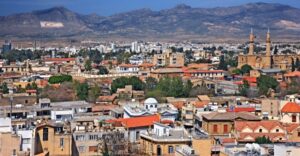In order for Europe to address the current governance issue and convince citizens that it works in their interest it should turn to a left-wing progressive federalist model, Nikos Pappas told EURACTIV.com in an interview.
Nikos Pappas is a leftist politician and minister for digital policy, media and telecommunications in Alexis Tsipras’ government.
In a wide-ranging interview with EURACTIV.com’s Sarantis Michalopoulos, Pappas said:
- – The Greek economy has left behind past uncertainties;
- – Greece’s socialists are in disharmony with the collaborative spirit of the EU [Greens, leftists, socialists];
- – Greece is turning to new technologies and high-speed internet to “revolutionise” the economy;
- – EU partners wonder why specific groups of Greek citizens – such as lawyers – do not meet their obligations;
- – Greek TV channel owners do not want a new tender to take place in order to get legal operating licenses – they have been operating illegally for 30 years;
- – Justice decisions are not beyond criticism.
– The second review of the bailout programme was successfully concluded and the Greek economy has come out of the EU’s excessive deficit procedure. What is your next step?
I think the cycle is coming to an end that puts aside any uncertainty as to whether Greece can recover. From now on, a growth plan should be implemented that does not repeat the mistakes of the past. These mistakes are related to excessive borrowing on both public and household accounts, but also the huge inequalities that arose from a model of economic policy that put both European societies and political leaderships to the test.
Greece is at a unique point on the map, regaining its role internationally and taking advantage of its geostrategic position. It can be a telecommunications, commerce and transport hub, but in order to do that in a compact and reliable way, it needs modern networks.
We have already completed major motorways, at a cost to the public of €750 million less than the contracts we have received, and we are now entering the process of building modern internet networks. The high-speed internet networks for all Greeks are the ones that will bring the country into a new phase. These technologies can make all sectors of the Greek economy more efficient and productive. They are in a position to revolutionise the way in which Greek producers produce, the way consumers consume and the way the Greek businesses operate.
– Is Europe convinced that Greece has turned the page? There are still voices which claim the opposite.
You are right to point it out, but I think the pessimists that see the glass half-empty are becoming ever smaller in number as time passes, under the unbearable weight of a growing economic reality.
This reality says that Greece has also increased employment by 320,000 jobs in two-and-a-half years, while the unemployment has dropped 5.5% compared to the previous coalition government between centre-right New Democracy (EPP) and the Pan-Hellenic Socialist Movement (Pasok, S&D). In addition, the budget is in order and exports and investments have increased.
Industrial production, for example, according to official statistics, has risen this month by 19% compared to last year. Consequently, the signs of economic recovery are strengthening and I think whatever solution is chosen and should be completed, it should not undermine these growth prospects.
– What could be a major obstacle to the continuation of the country’s recovery?
I think a new delay, but it does not seem to be the case. Because all sides have understood that it is in everyone’s interest to complete the negotiation with the medium-term debt measures that will be implemented after the end of the programme.
We need to note that two very important steps have been taken with the Eurogroup decision.
Firstly, it’s the provision for the implementation of the Greek debt growth clause and its repayment. The economic logic changes. In the two previous programmes, we had to restrain the economy to service the debt, even at the cost of recession. Now the debt is serviced by growth, so we become partners with our partners in the prospect of economic growth.
The second important issue is the final paragraph of the decision, which provides for the creation of the proper reserves that will guarantee Greece’s exit to the markets without any other conditions. The European Stability Mechanism (ESM), Europe’s financial arm and its political leaderships, guarantee the smooth financing of a country in a programme. This is a huge step.
The first successful return to the markets shows that the country is on the rise.
– We are ahead of difficult and complicated negotiations for Brexit. Some believe that Europeans will have one voice; others claim that there will be significant divisions. How does Athens see it?
Europe is faced with some choices that have long been leading to these deadlocks. There is a governance problem.
Europe has lost its ability to persuade people that it works in their interest. Of course, we must say that the critical political developments of the last year, a year that some looked at with curiosity and others with horror – the British referendum, a French and a Dutch election – has come and gone without the European project being dismantled. Therefore, it has to be recognised that the EU project has more stamina than anyone could have believed.
The solution, in my opinion, lies in a left-wing progressive federalism; this is the road that Europe and the left-wing forces have to take. The progressive ones who perceive this as a priority need to consolidate their initiatives so that policies can be implemented in this direction.
– The Grand Coalition in the European Parliament is over. We see that alliances have already begun to form within the Parliament around concrete legislative initiatives, and other initiatives such as the so-called Progressive Caucus [S&D, GUE/NGL, Greens] have been launched. Why isn’t this happening in the Greek political scene?
The Progressive Caucus is an extremely important initiative, which needs to be strengthened by all means. In Greece, unfortunately, there is an absolute mismatch in relation to the climate of understanding and discussion between the European families of the socialists, the left and the Greens. There are other political choices, but this is not our own problem. It is a problem for others to explain this fundamental contradiction.
Alexis Tsipras is the prime minister who is invited to the European Socialists’ conferences. EU socialists speak very positively about Greece and the government. These words are a mismatch with the style and the tone of criticism within the country of the Democratic Coalition [a group of Greek socialist parties affiliated to the S&D].
– At what stage is the issue of the tender for TV licenses?
Here we have made some positive steps in the last few weeks. Greece’s independent regulatory authority, the National Council for Radio and Television (NCRTV), which was set up last October, seems to be determined to move on.
We will soon have the notice for a new TV license bid. The first necessary steps have been taken, the number of licenses has been set and there seems to be a willingness to complete this process and to close a wound for the country, which has been open for decades.
What often makes it difficult for our negotiating team or the Greek prime minister himself during discussions at European level is that the negotiating counterparts do not understand why there may be some special categories of citizens who do not meet their obligations.
– What do you mean exactly?
Apart from the owners of the television stations, who for 30 years have been doing business without a license, we also have the example of some lawyers who feel that their profession cannot be subject to the Electronic Transactions Act, because, as they claim, privacy issues arise from the cases they undertake. The same opinion is shared by some “high-ranking” doctors. Let’s not forget that some judges have also claimed the right not to file a wealth statement, as most civil servants do.
There is a distortion that dates back to the period when New Democracy and PASOK were in power, but I am optimistic that we will make a breakthrough.
We all have to understand this. Such wounds cannot be left open in a Greece that is trying and ultimately emerging from the crisis, slowly but surely. The current government will not allow these wounds to remain open. We should show our partners and ourselves and send a message to society that we will not repeat these mistakes.
– Recently, a TV station (Star Channel) filed a lawsuit against the State for “loss of profits” due to the loss of a television programme. Particularly, it blamed last year’s television license tender. How do you comment on this legal move?
It is clear now. After this lawsuit and the announcements of the owners of the television stations, they [the TV channel owners] do not want a new tender to take place in order to get legal licenses for their operations. And above all, they do not want to put their hands in their pockets to pay for their use of public property.
Our answer is clear. The implementation of the laws and the Constitution will not accept any exemptions. No matter how many attacks we receive, we do not back down.
As for the actions of the channels, you should also ask the opposition parties. Can a television station, which for many years has broadcast without a legal license, seek compensation – after 30 years – for the first tender for television licenses? Can it demand, taking advantage of the responsibility of New Democracy and Pasok that did not enforce the licensing the channels, the preservation of this lawlessness?
A response from these political parties would also be interesting in the sense that the owners of the TV stations recently claimed to have been ‘hostages to insecurity’ for decades. What does this mean and how exactly did the two parties behave when they were in power?
They should finally take a position. Mr Mitsotakis [leader of New Democracy] and Ms Gennimata [Leader of Pasok] should not bury statements suggesting that their parties ‘kept the Press hostage’.
– What has been happening with the Greek justice system lately? The opposition blames you for attacking its independence.
There was a decision recently which considers that non-payment of employees’ salaries does not constitute an unfavorable change in the employment contract. This is beyond what we consider to be a European acquis.
We are entitled to judge it, even publicly. Justice representatives’ assessments are not beyond criticism.
If this is seen as an attack on the independence of the institution, we should also look at the cases of interference, as perhaps – according to press reports – we had in the past.
– The opposition also accuses you of having imposed excessive taxation; that the state’s debt to individuals is huge and calls for elections to follow a different policy mix.
The elections will be held at the end of our term. Alexis Tsipras will be the first prime minister since the country joined the bailout programme to stay until the end of the four-year mandate. Such a development would be a signal of stability and recovery. We challenge the main opposition party to stop focusing on nonsense and talk about the essence of politics. It should come to the table and discuss the hard core of policy and the results we bring. But because it cannot stand this debate, as the reality is clear and resounding, it brings up other issues that provoke ridicule and mockery among the Greek people.
– What did you discuss at your recent meeting with EU Commissioner for the Digital Economy and Society Mariya Gabriel?
With the Commissioner, we have agreed on a number of necessary steps that need to be taken, while a visit to Greece is expected.
We outlined the action plan for the development of ultra-fast internet networks and our expectation, which was fully in line with the Commissioner’s, to support the EU cybersecurity agency. Very soon, we will be ready to capitalise on the efforts made by both the Commission and Greece to develop these new technologies.
Source: www.euractiv.com
Ask me anything
Explore related questions





